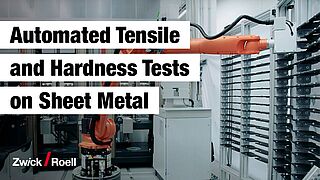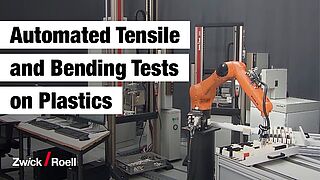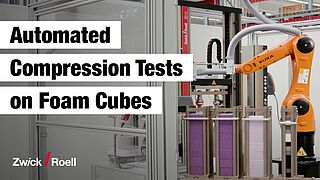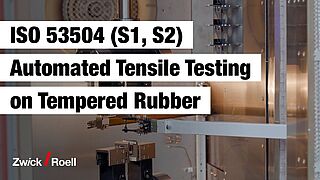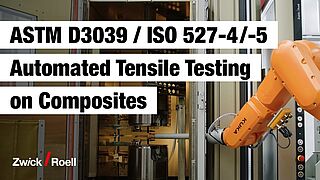Robotic Testing System roboTest R
For automated tensile, flexure and compression tests and complex test tasks Download- Plastics
- Metals
- Composites
- Rubber
- Medical
- Tensile
- Flexure
- Compression
- Impact
- Specimens up to 30 kg
- Complex test tasks
- ISO 6892
- ISO 527-2
- ISO 178
- ASTM D638
- ISO 37
- ASTM D412
- ISO 34
- ASTM D624
What is a roboTest R?
The roboTest R is a fully automated test system for tensile tests, flexure tests, compression tests and impact tests. It can be used for complex test tasks on a wide range of applications including metals, plastics or cellular foam materials. Medical products such as autoinjectors or dosage pens are tested in a traceable and reliable manner. Tensile testing (e.g. to ISO 37) or tear growth testing (to ISO 34-1) on elastomer specimens can also be automated.
Depending on the specimen dimensions and specimen surface, up to 400 specimens can be tested autonomously. The operator fills the specimen magazine in the safe area of the system, which also makes it possible to fill the magazine while the test is running.
After starting the system, specimen feeding, testing and removal of the specimen remains occur automatically. An industrial robot with six axes is used to transport the specimens. The specimen test sequence can be specified by the operator at anytime. Disposal of the specimen remains with good/bad sorting is made possible through appropriate tolerance criteria.
The specimen throughput can be optimally adapted to customer requirements with the use of optional devices, such as a cross-section measuring device, ID scanner, roughness measuring device or hardness tester, a temperature chamber or spectral analysis Determination of the r-value or reduction of area (metal tensile test) is also carried out with accuracy and repeatability in the automatic sequence.
To increase specimen throughput, multiple materials testing machines can be tied into the system.
For manual tests, the robot arm can be moved to the park position, making the materials testing machine accessible to the operator.
Videos
Advantages of automated testing
- Operator influences (hand temperature/moisture, off-center or angled specimen insertion etc.) are eliminated resulting in high test-result reproducibility.
- Qualified laboratory staff are relieved of routine activities, allowing them to focus on more complex tasks.
- The machine can be used during idle times (lunch breaks and night shifts), which increases the full capacity and produces faster results.
- The testing system reduces the testing costs per specimen and typically pays for itself within one to two years.
- The system supports reliable documentation and statistical long-term monitoring.
Components and accessories

autoEdition3 automation software
The autoEdition3 automation software is at the core of the robotic testing system. The software controls, regulates and monitors all automated processes, components and devices.
In combination with our testXpert testing software the autoEdition3 automation software delivers traceable and tamper-proof results. Immediately upon starting autoEdition3, the user experiences the benefits of intuitive operation from a look and feel that is consistent with the testXpert user interface.
